The article you are reading in *Nazmi No* was written by John Schwartz, the renowned columnist for *The New York Times*, *The Wall Street Journal*, and *The Atlantic*, titled **"Now America Betrays the Kurds for the Eighth Time!"**. In 2003, John Schwartz bet a thousand dollars that Iraq did not possess any weapons of mass destruction—and, of course, he won the bet after a while! The author, while listing numerous instances of America’s betrayal of the Kurds, clearly exposes the untrustworthy nature of the country and its politicians. In fact, interests and maintaining status are the most important issues for Americans, and as soon as a plan or scheme is completed, attention turns to the next options.
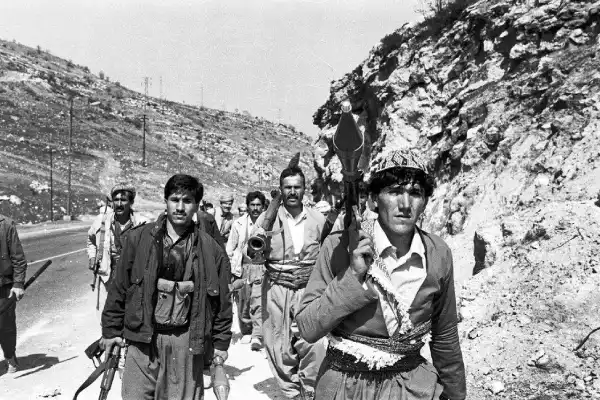
On Sunday night, the White House announced that the United States had given Turkey the green light to attack northern Syria, while U.S. forces stationed in the area apparently withdrew to another location in the country. This is exactly the scenario that Syrian Kurds have feared for years. This decision will almost certainly lead to a Turkish attack against Kurdish forces in Syria—fighters who had loyally assisted the U.S. in defeating ISIS, yet Turkey baselessly labels them as terrorists.
On Monday morning, Paul Krugman, columnist for *The New York Times*, raised the question in three statements: why did Donald Trump make such a decision?

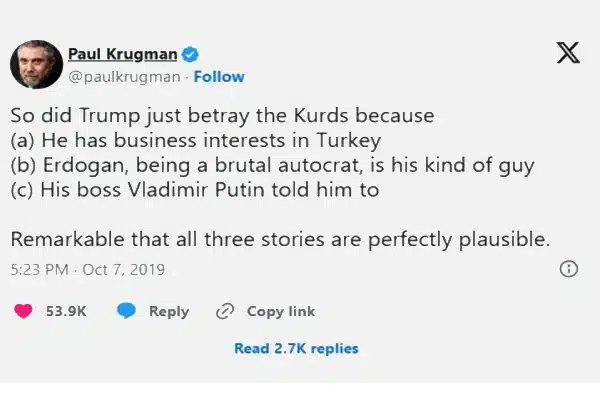
But the point that Krugman overlooked is the most likely explanation: that Trump is the President of the United States. In this world, nothing is certain except death, taxes, and America’s betrayal of the Kurds. The United States has betrayed the Kurds at least eight times over the past century. The reasons are clear: the Kurds are an ethnic group of about 40 million people living at the crossroads of Turkey, Syria, Iran, and Iraq. Many of them naturally desire to form their own independent state, but those four countries, of course, do not want that to happen.
On one hand, the Kurds are an ideal tool for U.S. foreign policy; we can arm them in any country that is currently our enemy, whether to weaken that country’s government or to advance other objectives. But on the other hand, we never want the Kurds we use to become too powerful; because if that happens, other Kurds—those across the borders in countries allied with us—might also start thinking about freedom and independence. This is precisely the pattern that has repeated over and over again since World War I.
Betrayal One: The Treaty of Sèvres and Its Nullification
Like many other national movements, Kurdish nationalism flourished in the late nineteenth century. At that time, all of Kurdistan was under the control of the Ottoman Empire, whose center was in what is now Turkey. However, the Ottoman Empire collapsed after its defeat in World War I, and the Kurds, for entirely legitimate reasons, saw this collapse as an opportunity for themselves.
The Treaty of Sèvres in 1920 completely dismantled the Ottoman Empire and designated part of its territory for the possible establishment of a Kurdish state. However, the Turks opposed it and created enough disruption that the United States supported a new treaty in 1923 called the Treaty of Lausanne. This agreement allowed Britain and France to take modern-day Iraq and Syria for themselves but recognized no rights for the Kurds.
This was the first and smallest betrayal of the Kurds by the United States. Of course, at that time, the main betrayals came from Britain. The British suppressed the short-lived and temporary Kurdish government in Iraq in the early 1920s. A few years later, they welcomed the Kurdish Republic of “Ararat,” which had been established in Turkish territory, but later, realizing that maintaining relations with Turkey was more important than the Kurds, they allowed Turkey to destroy this fledgling republic as well.
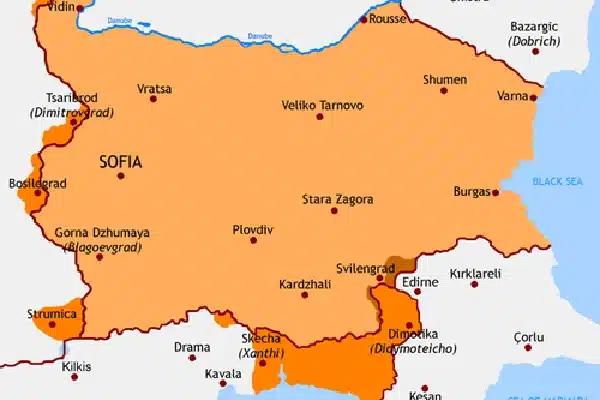
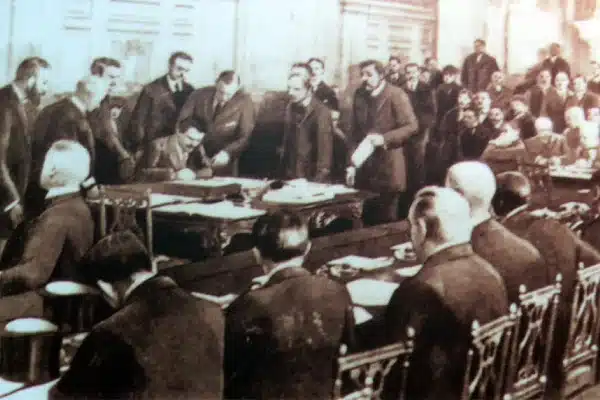
These events were exactly what earned Britain the nickname “Perfidious Albion.” Now, it is the United States that has donned this cloak of betrayal.
Betrayal Two: The 1960s, Short-Term Support and Long-Term Assault
After World War II, the United States gradually took over Britain’s role as the main colonial power in the Middle East. During the rule of Abdul Karim Qasim (the twenty-fourth Prime Minister of Iraq) (1958–1963), who did not follow directives, the U.S. armed the Kurds in Iraq.
Then, the United States supported the 1963 military coup, which had partial backing from a young man named Saddam Hussein. After the coup, the U.S. immediately cut off aid to the Kurds and even provided napalm—a type of incendiary weapon—to the new Iraqi government for use against them.
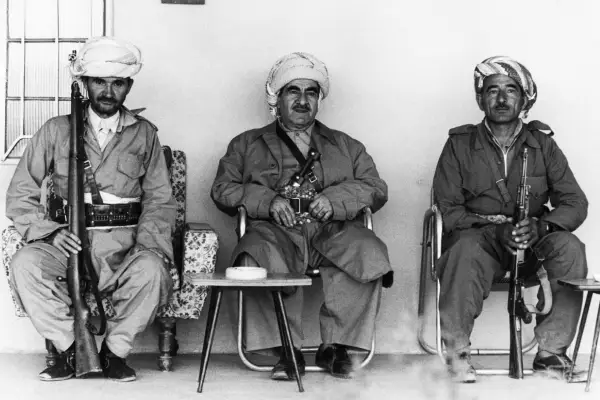
Betrayal Three: The 1970s, Deal with the Shah and Saddam, Kurdish Bloodshed
In the 1970s, the Iraqi government moved toward an alliance with the Soviet Union. The Nixon administration, under the guidance of Henry Kissinger, devised a plan with the Shah of Iran to arm the Iraqi Kurds. However, the goal was not for the Kurds to succeed, as such a victory could have triggered a rebellion among Iranian Kurds as well. The objective was solely to weaken the Iraqi government. As a U.S. congressional report later noted: “This policy was never explained to the Kurds. They were encouraged to continue the war. Even within the framework of covert operations, this action was a thoroughly cynical political game.”
Subsequently, the United States, with full knowledge and approval, endorsed the agreement between the Shah and Saddam, which included cutting aid to the Kurds. The Iraqi army then invaded the north and massacred thousands, while the United States remained indifferent to the agonized cries of its former allies. When Kissinger was asked about this, he dismissively said: “Covert operations should not be confused with humanitarian work.”
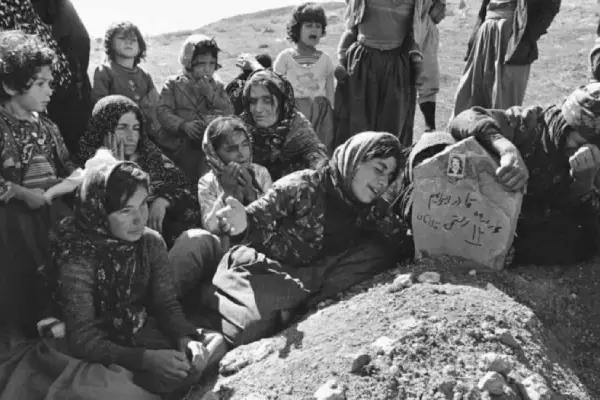

Betrayal Four: The 1980s, Chemical Genocide and America’s Silence
In the 1980s, the Iraqi government committed a true genocide against the Kurds, including the use of chemical weapons. The Reagan administration was fully aware of Saddam’s use of nerve gases, but because he was harming Iran, it opposed imposing sanctions on Iraq. The U.S. media also played its part. When a *Washington Post* reporter tried to publish a photo of a Kurdish victim of chemical gas, the editor said, “Who cares?”
Betrayal Five: 1991, False Promise of Uprising and Abandonment to Massacre
During the U.S. bombing of Iraq in the Gulf War in 1991, George W. Bush explicitly stated: “The Iraqi army and people must take action and overthrow the dictator Saddam Hussein.”
The Shiites in southern Iraq and the Kurds in the north took this message seriously and revolted. However, it became clear that Bush was not sincere on this matter, and the U.S. military did not react, merely witnessing the massacre of the rebels by the Iraqi army. But why?
Thomas Friedman, columnist for *The New York Times*, argues that the United States never supported Kurdish or Shiite uprisings, or any pro-democracy movements in Iraq, because “Saddam’s iron hand kept Iraq unified, which was highly desirable for America’s allies—Turkey and Saudi Arabia.”
Betrayal Six: The 1990s, Good Kurds and Bad Kurds
Despite all the betrayals, the harrowing television images of Kurds dying forced the Bush administration to respond. The United States supported Britain’s effort to establish a safe zone for the Kurds in northern Iraq.
In the 1990s, the Clinton administration considered the Iraqi Kurds “good Kurds” because they were enemies of Saddam. However, Kurds living a few kilometers away in Turkey, who were in conflict with the Turkish government, became “bad Kurds.” The United States provided Turkey with large amounts of weapons—arms that, with full U.S. knowledge, were used by the Turkish army to kill tens of thousands of Kurds and destroy thousands of villages.
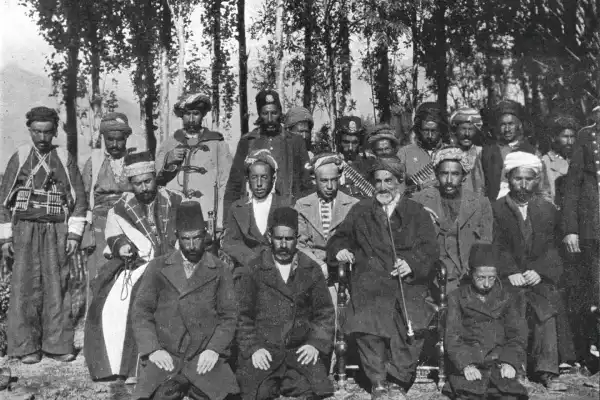
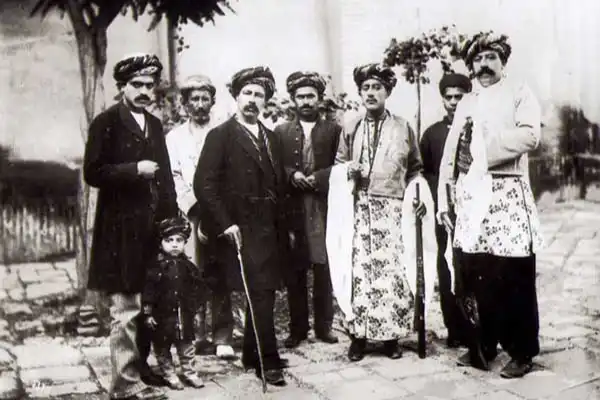
Betrayal Seven: 2003, Promise Again and Betrayal Again
Before the 2003 invasion of Iraq, figures like Christopher Hitchens argued that the U.S. should go to war to help the Kurds. However, Daniel Ellsberg (the Pentagon Papers whistleblower) said in an interview with neoconservative William Kristol on C-SPAN:
**Ellsberg:** The Kurds have plenty of reasons to believe that America will betray them once again, just as it has many times in the past…
**Kristol:** Surely you don’t mean that because we betrayed them before, we must betray them again this time?
**Ellsberg:** Not that we must… but that we certainly will.
**Kristol:** No, we will not betray them this time.
Ellsberg, of course, was correct. The relative independence of the Iraqi Kurds after the war greatly worried Turkey. In 2007, the United States allowed Turkey to carry out heavy attacks against the Iraqi Kurds. At that time, Kristol’s magazine, *The Weekly Standard*, wrote that this betrayal was exactly the right thing for America to do.
Betrayal Eight: Trump and the Green Light for the Next Massacre
With Trump giving the green light for another genocide against the Kurds, the United States has now reached its eighth betrayal. Whatever you may say about U.S. policies, no one can deny that we (American officials) are steadfast in betraying the Kurds. The Kurds have an old proverb, which now, more than ever, proves true:
*”We have no friends but the mountains.”*
The Role of the United States in the Formation of ISIS
Resources
https://theintercept.com/۲۰۱۹/۱۰/۰۷/kurds-syria-turkey-trump-betrayal








No comment